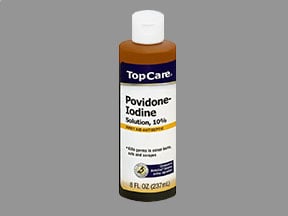
Betadine Coupons & Savings Card – Discount Prices from $5.70
Brand for: Povidone-iodine
My prescription
Edit
48 solutions 118ML of 10%, Povidone-iodine (1 Bottle)
Select pharmacy

Albertsons
$5.70
COUPON PRICE
Walgreens
$5.70
COUPON PRICEBetadine savings card
Show this card to your pharmacist
Albertsons
$5.70
BIN
ID
PCN
GRP
011867
LH92690766
HT
LABH001
Powered by
Price history for Betadine (brand) & Povidone-iodine (generic)
1 Bottle, 118ML of 10%
Average retail price for Betadine
Average retail price for Povidone-iodine
Average SaveHealth price for Povidone-iodine
Our price history data is based on aggregated prescription data collected from participating pharmacies in America. Our prescription data updates daily to reflect the latest price changes. If you notice a missing data point, it means there wasn't sufficient data available to generate a monetary value for that date.
Over the last 12 months, the average discount price of Betadine is $5.04 using the SaveHealth savings card. That's an average savings of 61.05% on Betadine with our discount card.
*Retail prices are based on pharmacy claims data, and may not be accurate when we don't have enough claims.
Betadine (Povidone-iodine) dosage forms
Dosage Quantity Price from Per unit 118ML of 10% 1 Bottle $7.96 $7.96 118ML of 10% 2 Bottles $8.41 $4.21 118ML of 10% 3 Bottles $8.87 $2.96
| Dosage | Quantity | Price from | Per unit |
|---|---|---|---|
| 118ML of 10% | 1 Bottle | $7.96 | $7.96 |
| 118ML of 10% | 2 Bottles | $8.41 | $4.21 |
| 118ML of 10% | 3 Bottles | $8.87 | $2.96 |
Is Betadine the same as iodine?
Betadine is not the same as iodine, but it contains iodine as its active ingredient. Betadine is a brand name for a topical antiseptic solution that contains povidone-iodine, which is a complex of iodine with a polymer that releases iodine slowly. This allows it to be used as a disinfectant for skin and wounds.
Where should you not use Betadine?
Betadine should not be used on large areas of the body, on deep or puncture wounds, serious burns, or if there is an allergy to iodine or povidone-iodine. It is also not recommended for use in the eyes or on mucous membranes unless specifically directed by a healthcare professional.
What does Betadine do for a wound?
Betadine is an antiseptic that helps to prevent infection in minor cuts, scrapes, and burns. It works by killing bacteria and other microorganisms on the skin, thereby reducing the risk of infection and promoting healing.
Which is better, Betadine or neosporin?
The choice between Betadine and Neosporin depends on the specific situation and the type of wound or infection being treated. Betadine is an antiseptic that is effective in killing a wide range of bacteria, viruses, and fungi, making it suitable for cleaning wounds to prevent infection. Neosporin, on the other hand, is an antibiotic ointment that helps prevent bacterial infections in minor cuts, scrapes, and burns.For cleaning a wound, Betadine might be preferred. For preventing bacterial infection in a clean wound, Neosporin could be more appropriate. It is important to consider any allergies or sensitivities to these products and consult a healthcare professional if unsure.
Are iodine and Betadine interchangeable?
Iodine and Betadine are not interchangeable. Iodine is a chemical element used in various forms for medical purposes, while Betadine is a brand name for a povidone-iodine solution, which is a combination of iodine and a polymer that makes it more stable and less irritating to the skin. Betadine is commonly used as an antiseptic for skin disinfection before and after surgery.
